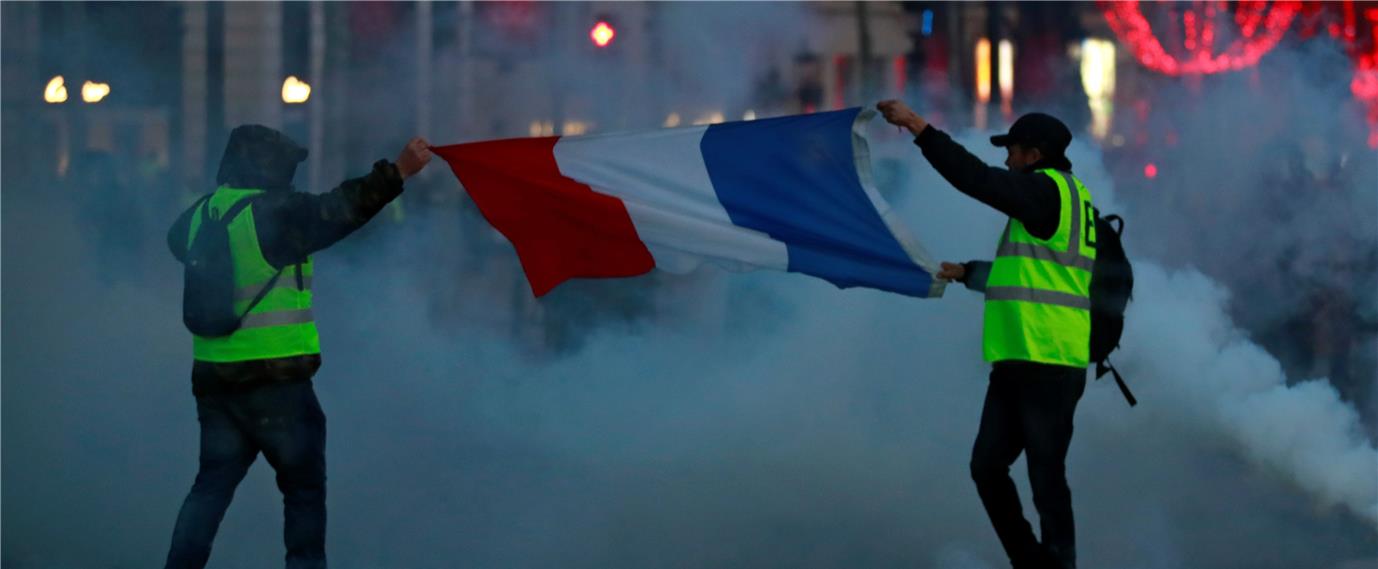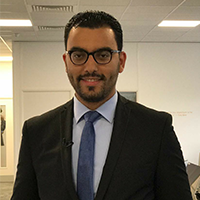شهدت الساحة الإعلامية العالمية، خلال الفترة الماضية، حدثين مهمين، تحول فيهما الصحفي من ناقل للخبر إلى موضوع للخبر، الحادثة الأولى هي المواجهة الشهيرة بين الرئيس الأميركي دونالد ترامب، ومراسل شبكة CNN جيم أكوستا، والتي على إثرها سحب من الصحفي تصريح دخول البيت الأبيض، قبل أن يسترجعه بحكم قضائي. أما القضية الثانية، فهي ظاهرة الهجوم على الصحفيين الفرنسيين أثناء احتجاجات "السترات الصفراء" التي اجتاحت الجمهورية بعد قرار الحكومة رفع الضريبة على المحروقات، وسبب الهجوم حسب المحتجين، أن تغطية الصحفيين متحيزة لصالح الحكومة وتشيد برجال الأمن.
وإذا كان من الطبيعي أن تكون هناك مواجهة مفتوحة بين الصحفيين والسياسيين، بالنظر لكون الصحافة توصف كسلطة رابعة، في مواجهة بقية السلطات الأخرى، فإن الجديد وخصوصا في الغرب، هو هذا الغضب الجماهيري من الصحفيين، بحيث تحول رجل الإعلام إلى "عدو"، لأنه لم يقف مع أطروحة المتظاهرين. هذا الوضع يعد مستغربا في فرنسا حيث للصحفي وضع اعتباري، بوصفه صمام الأمان لحماية مبدأ حرية التعبير، الذي هو عماد الديمقراطية.
هل يضيع القرار التحريري من أيدي الصحفيين؟
يحذر الصحفي الأميركي جيف هوي في كتابه "Crowdsourcing"، من ضياع القرار التحريري من أيدي الصحفيين لفائدة الجمهور في مواقع التواصل الاجتماعي، بل إن الكاتب يقول إن الصحفيين المهنيين ما عادوا هم الذين يقررون زوايا المعالجة للعديد من القضايا الحساسة، بل إن هذه المهمة بات يتولاها الجمهور على منصات التواصل الاجتماعي، وهذا تحول خطير، يقول الكاتب.. "لأن الخط التحريري كان في السابق بين أيدي قلة قليلة من الصحفيين من ذوي الخبرة والكفاءة".
ويذهب الكاتب في تحليله أبعد من ذلك، عندما يستند على "قانون ستورجن" الذي يقول إن 90% من المواضيع المنشورة في مواقع التواصل الاجتماعي، ليس لها أي قيمة، ومع ذلك فهي تؤثر على قرارات الصحف والصحافة. ويمكن الاستنتاج من هذه الأطروحة حجم الضغط الذ يواجهه الصحفيون، أثناء تغطيات الحملات الشعبية التي باتت تنطلق في الكثير من الأحيان من العالم الافتراضي وتجد تجسيدا لها في الشارع.
فالمشارك في هذه الاحتجاجات، يجد نفسه بين من يشاركونه نفس الرأي ونفس الموقف في مواقع التواصل الاجتماعي، وكذلك عندما ينزل إلى الشارع، فيتولد لديه انطباع بأن الجميع يسانده، وعندما يجد صوتا يعارضه يشعر بالانزعاج. وهذا ما حدث في مظاهرات السترات الصفراء التي حازت على دعم شعبي كبير، لولا أن ممارسات بعض المنتسبين إليها من أعمال تخريب للممتلكات العامة والخاصة، دفع بعدد من المنابر الإعلامية للحديث عن هذه الأعمال التخريبية وانتقادها.
لم يرق هذا الموقف للمحتجين، وتهجَّموا على عدد من الصحفيين، بدعوى أنهم أبواق للحكومة، وتطورت الأمور إلى تسجيل خمسة صحفيين فرنسيين شكاية لدى الأمن الفرنسي، بدعوى تعرضهم للضرب والإهانة والتهديد بالقتل.. ممارسات غير مسبوقة في فرنسا، حيث يعتبر المس بالصحفي مسا بحق مقدس وهو حرية التعبير، وهو ما أثار غضب الصحفيين، الذين اعتبروا أن مهمة الصحفي ليس إرضاء الجمهور، بل تقديم الحقيقة ونقل الوقائع كما هي لا كما يريدها أي طراف في المواجهات.
ولم يتأخر رد النقابة الوطنية للصحافة في فرنسا، حيث أصدرت بيانا عبرت فيه عن تضامنها مع الصحفيين، وقالت إن "الصحفيين لا يجب أبدا أن يكونوا هدفا لأي اعتداء، لأن نقل الأخبار ليس جريمة، وعلى الجميع أن يستوعب أن الإساءة للصحفيين تعني الإساءة لحرية التعبير التي تعتبر عمادا للديمقراطية الفرنسية"، وهو موقف مفهوم من النقابة التي ترى أن أعضاءها باتوا مهددين في سلامتهم الجسدية.
رد الصحفي على الإساءة.. بين التفاعل والانفعال
بعد مرحلة الإدانة ورفع الشكاية لدى الأمن، يثار السؤال حول تأثير هذه الاعتداءات على نفسية الصحفيين، وهل يمكن أن يتحول الأمر إلى معركة شخصية بين الصحفيين والمحتجين؟ تنتشر في غرف تحرير وسائل الإعلام الفرنسية عبارة "Garder la tete froide"، أي ضرورة حفاظ الصحفي على هدوء أعصابه حتى في الأوضاع الصعبة، وحتى إن وجد الصحفي نفسه في فوهة المدفع، فلا يجب أن يؤثر هذا على عمله في نقل الحقيقة والحفاظ على الموضوعية، وألا يجعل من نفس طرفا في القضية التي يغطِّيها، إن وجد أن الذاتية باتت غالبة عليها فيتعين عليه الانسحاب من التغطية.
ولهذا السبب انتشرت دعوة في مواقع التواصل أطلقها ثمانية صحفيين فرنسيين عبر وسم "Paye toi un journaliste"، أي اشتر لك صحفيا، كتعبير على أن الصحفي ليس ملكا للمحتجين. ويقول أصحاب المبادرة إن الهدف من هذا الوسم هو الإدانة العلنية للاعتداء على الصحفيين، وأيضا ضمان ألا تخلق هذه الحادثة حالة من العداء بين المواطن والصحفي، وبأن هذا الأخير هو في النهاية إنسان قد يخطئ في التقدير وعليه تقبل الانتقادات، ولكن ليس لدرجة أن تصل إلى الاعتداءات الجسدية.
أمام هذه المبادرة التي يبدو أنها تخشى من خلق حالة من سوء الفهم بين الصحفي والقارئ، وتحول الإعلامي إلى "عدو" الجماهير، ظهرت دعوة أخرى يبدو أنها تندرج في إطار رد الفعل الانفعالي، حيث طالب عدد من الصحفيين في مدينة تولوز الفرنسية، بمقاطعة الاحتجاجات وعدم تغطيتها، والسبب حسب هؤلاء هو ضمان سلامة الصحفيين، وبعث رسالة إلى المحتجين بأنه بدون الصحفيين، لن يصل صوتهم لأصحاب القرار، وسيفقدون حلقة وصل مهمة بين المتظاهرين والرأي العام. تفاعل مع هذه الدعوة قنوات مهمة في مدينة تولوز كقناتي BFMTV، وcnews، إضافة لقناة M6، وهي القنوات التي نالت النصيب الأكبر من الانتقاد وتعرض صحافيوها للاعتداء.
في المقابل اختارت قناة فرنسا 3، أن يكون لها رد آخر على الموضوع، بإنجاز تقرير عن الاعتداءات وأخذ ردود فعل السترات الصفراء، المستنكرة لهذه الانتهاكات، وإنجاز حلقة حول الاعتداء على الصحفيين، وخطورتها على الديمقراطية. ويبرر رئيس تحرير القناة ليو لامبرتون هذا الاختيار، بأن إغلاق الباب أمام هذه الاحتجاجات، سيؤدي إلى مواجهة أكبر بين "عشرات الفاشيين والآلاف من المتظاهرين السلميين".
هذا الرأي الأخير هو الذي أخذت به العديد من وسائل الإعلام الفرنسية، لأن المقاطعة، ستظهر أن هناك حالة من الخصومة بين الصحفيين والمتظاهرين، كما أنها قد ترسل رسالة خاطئة لمثيري الشغب بأن الصحافة قد ترضخ أمام التهديد أو الاعتداء.
ومع ذلك فهذه الاحتجاجات تضع الصحفيين أمام تحد حقيقي، لضرورة التوفر على الجرأة الكافية، لإدانة السلوك الخاطئ للمحتجين، في جو مشحون وجو من التحريض، وفي الوقت ذاته عدم التأثر بالإساءة، وإيصال مطالب المحتجين بأمانة.. معادلة صعبة لأنها تحتاج الكثير من الجهد للتخلي عن الذاتية؛ فكل صحفي يشاهد مقاطع ضرب زملائه في المهنة، الأكيد أنه سيشعر بنفسه معنيا، وأنه هو الآخر تعرض للإساءة، ومع ذلك يجب وضع حد فاصل بين التضامن المهني، وبين أداء المهمة الصحفية.
أزمة ثقة
ويرى الصحفي والباحث الأكاديمي سعيد سالمي، المقيم في فرنسا، أن السترات الصفراء هي حركة اجتماعية غير ممأسسة، وهي نتاج "لإفلاس الديمقراطية التمثيلية الفرنسية في ظل الجمهورية الخامسة". وبالنظر لكون هذه الحركة تبلورت بعيداً عن مؤسسات الوساطة التقليدية على غرار الأحزاب والنقابات، وهي حركة غير مهيكلة وغير مؤطرة، ولا تتوفر على زعامات، فهي تخاطب جهة واحدة وهي رئاسة الجمهورية، وتتجاهل الحكومة والأحزاب السياسية والنقابات إضافة لوسائل الإعلام، باعتبارها من وسائل الوساطة، وهذا ما يعكس في جزء منه حالة العداء التي يحملها بعض المتظاهرين للإعلام الفرنسي.
ويضيف الباحث سالمي، أن استحالة التأطير يجعل منها حركة شعبية تلتف حولها كل الأطياف المجتمعية الفرنسية، و"لكنه بالمقابل يجعل منها حركة خطيرة للغاية، إذ لا يمكن التنبؤ بمآلاتها، سيما أنها تخاطب جهة وحيدة، مشيرا إلى أن "تركيز الإعلام على أعمال العنف التي شهدتها باريس، مع العلم أنها حالات معزولة قياسا بمئات الاحتجاجات التي شهدتها فرنسا في الأقاليم، وكانت سلمية منذ بدايتها إلى نهايتها، كان من أسباب غضب المتظاهرين على الإعلام".
وختاما، تجدر الإشارة إلى أن هذه الاعتداءات تخفي في جزء منها أيضا حالة من الرفض لوسائل الإعلام ولخطابها الذي يراعي أخلاقيات المهنة في الموضوعية والدقة، وكأنهم يقولون إنه لا حاجة لنا بوسائل الإعلام إن كانت مواقع التواصل الاجتماعي، توفر لنا منصة يمكن لنا عبرها أن نعبر عن موقفنا، وننقل مباشرة مظاهراتنا بالطريقة التي نريد والزاوية المناسبة لنا، دون قيد أو شرط، وهذا نقاش ليس جديدا بين الخطاب الصحفي المقيد بالعديد من القواعد المهنية، والخطاب الافتراضي المنفلت من أي ضوابط، خصوصا في فترة الأزمات والاحتجاجات، ولهذا يرى المتظاهر المتعصب في الصحفي عدوا له، لأنه ينتج خطابا غير الخطاب السائد في تلك المواقع. وتكمن قوة الصحفي في استماعه لنبض الشارع واقترابه منه على ألا يتأثر بكل ما يقال، ما لم يتوفر على الدليل والحجة، فقبلة الصحفي دائما هي الحقيقة.








































